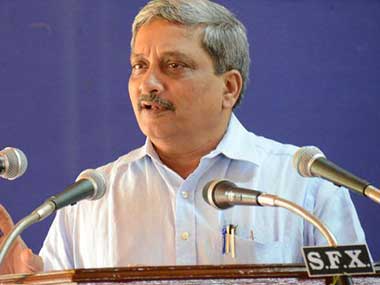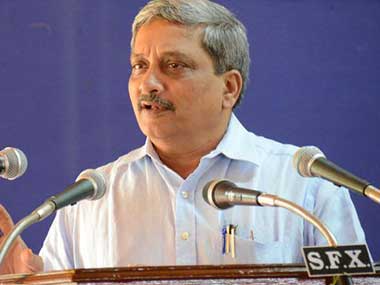From all accounts, it appears that Narendra Modi is going to expand his cabinet, and possibly reshuffle it substantially as well. One name mentioned by all media reports today (6 November) is that of Goa Chief Minister Manohar Parrikar as our next Defence Minister. If that happens, it would certainly be a good call, for defence clearly needs an able and clean minister, and few people come with Parrikar’s reputation for competence and transparency. Defence is clearly one portfolio too many for Modi’s multi-purpose handyman, Arun Jaitley. However, it would also be a good idea for Modi to use this opportunity to strengthen his ministry by weeding out the non-performers and take his agenda of creating a leaner and more focused cabinet to the next level. He needs more super-ministries and more super-performers. He needs more Parrikars and fewer Radha Mohan Singhs (Radha who?). (Get the whole list of current ministers here). Modi’s first crack at cabinet formation was a mixed affair with some known high-profile performers, and many non-entities who were there only for collateral reasons like not being part of dynasties or because Modi chose to pick them for their loyalty. [caption id=“attachment_1790863” align=“alignleft” width=“380” class=" “]  Goa chief minister Manohar Parrikar. Agencies[/caption] However, in round two, Modi needs to be bolder and less inclined to pick non-entities or retain non-performers. He should rejig his ministries based on competence alone because politically he has established himself as numero uno and has no reason to worry about rival power centres any more. Among the big names, Arun Jaitley in finance, Sushma Swaraj in external affairs, Nitin Gadkari in road transport and highways, Rajnath Singh at home, Venkaiah Naidu in urban development and parliamentary affairs, and Ravi Shankar Prasad in law and justice more or less select themselves for reasons of competence and/or political balance. Harsh Vardhan in health and Smriti Irani in HRD are borderline cases, and hence may be given another chance. Among the junior ministers, Piyush Goyal in power and coal, and Nirmala Sitharaman in commerce and industry have shown energetic performance, even though the results of their exertions are yet to show. Ram Vilas Paswan has not exactly distinguished himself at the food ministry, nor has Ashok Gajapati Raju at civil aviation, Anant Geete at heavy industry or Harsimrat Kaur in food processing, but they will be fixtures as they are representatives of alliance parties in the NDA. The surprising omissions in the first round were two ultra competent individuals – Arun Shourie and Suresh Prabhu. While Prabhu, who is from the Shiv Sena, cannot get a larger responsibility unless the BJP-Sena equation improves or he quits the Sena, Shourie’s case of exclusion is not apparent. However, for the large part, Modi’s cabinet reshuffle would be worthwhile if he now opts for the next big reform by cutting down the number of ministries and hives off public sector companies from the ministerial ambit. India has simply too many ministries working at cross-purposes and policy-making cannot be optimum till these are rationalised. As I have noted before (read here ), we need more super ministries, and smaller sector ministries under them, for better policy formulation and coordination. For example, when you have a ministry of industry, why do you need separate ministries for steel, textiles, chemicals and fertilisers, heavy industries, food processing, small and micro industry, tourism, etc. Are these not part of “industry”? You need one broad policy that takes care of all kinds of industry - not separate policies for separate industries. (We are already seven ministries too many here) Similarly, why would one need separate ministries for various kinds of energy: petroleum, coal, power, nuclear, new and renewable energy? Wouldn’t it make more sense to have one omnibus ministry of energy to ensure that all energy policies are coordinated and headed in the same direction? When one kind of energy can be substituted for another, does it make sense to have one policy on gas pricing, another on coal, yet another on solar energy, and still another on diesel or LPG? (That’s four ministries more that are redundant.) Do we need one ministry of transport, with railways, civil aviation, shipping and roadways under it, or multiple ministries each trying to do their own thing? Does the freight rate charged on railway cargo not impact road transport, or air cargo? (Three more ministries can be wrapped up under transport) When we have a ministry of law and justice, do we need separate ones to ensure social justice and empowerment, another one for women and children, for minorities, and for tribals? Next, we will have one for people with disabilities. Why does corporate law need a separate ministry? Can’t law and justice do it? Or can’t the industry ministry handle corporate issues? (Five ministries can go out of the window here) If agriculture is largely a rural activity, why do we need separate ministries for agriculture and rural development? (One more ministry down) The information and broadcasting ministry can easily be abolished – and Prasar Bharati (which runs Doordarshan and All India Radio) can be a public broadcaster with some degree of autonomy. Given the wide choice of news channels, the slant of government-owned media hardly matters. (One more gone) And what, on earth, do we need so many tiny ministries about whom we know almost nothing: the ministry of earth sciences, overseas Indians, culture, youth affairs and sports, drinking water, and so on? (Five out of the window) Quite clearly, ministries have proliferated just to give the surfeit of politicians a job to do – where they mostly feather their nests. This is not to suggest that sports, or culture, for that matter, are not important – just that they can be done departmentally under a more purposeful ministry. For example, both youth affairs and culture could conceivably come under either HRD or even in a quiet place under PMO. Take women and child development - issues relating to empowerment and gender justice are really matters for the law ministry; issues relating to maternal and child health are under the ambit of the health ministry. The only ministries that more or less cannot be abolished are finance, home, agriculture, law and justice, health, HRD, energy, transport, commerce and industry, defence, foreign affairs, and environment. To this I would add an omnibus new Ministry of National Assets, where all the companies and assets owned by the government can be housed and told to improve performance. This will achieve two purposes: One, it will bring a single-minded focus on performance, with the possibility of selling off some of the enterprises that need not remain in the public sector. With Arun Jaitley yesterday (5 November) talking about selling at least sick public sector units, the process can begin, even though ultimately the government has to accept the need for a larger privatisation programme. Two, it will free ministries from conflicts of interest where they make policy and also run companies affected by those policies. If the civil aviation ministry both makes policy and runs Air India, how can we accept a neutral and fair policy ever? Spinning off public sector companies is necessary not only for improving their performance, but because super-ministries cannot be effective if they also have to look at public sector performance. One question remains: what will happen to so many ministerial aspirants from various parties, including the BJP’s own cohorts, if we have only super-ministries at the centre? Answer: they will still be ministers, but with a smaller sectoral charge. A big Transport Ministry will need two railway ministers of state, a minister for road transport, another for shipping, etc. The super –transport ministry will need more ministers. So, the jobs aren’t being abolished. Only the levels at which these jobs remain are changing.
The Modi ministry, despite being compact, needs more competent starts and fewer non-entities. It needs more Parrikars and fewer Radha Mohan Singhs.
Advertisement
End of Article
Written by R Jagannathan
R Jagannathan is the Editor-in-Chief of Firstpost. see more


)
)
)
)
)
)
)
)
)



